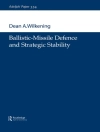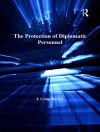Security Studies: An Applied Introduction offers a transformative tool to understand, analyse, and engage with the complexities of security in the modern world. This groundbreaking new text redefines the landscape of security studies with the following features:
- Policy-Relevant: each chapter provides analysis of policy responses to empirical security issues. This practical approach offers a toolkit to assess and contribute to real-world policy discussions.
- Empirical Application: vividly demonstrating the real-world relevance of Security Studies with online videos from leading security practitioners to show how theory informs practice.
- Pedagogically Rich: comprehensive online resources and chapters features such as ′security beyond the real′ and hands-on exercises that critically assess real-world security responses and their policy implications that offer ways to apply theoretical concepts in a highly innovative way.
- Innovative Structure: seamlessly integrating theoretical perspectives with empirical security concerns, this textbook offers a non-compartmentalised approach to theory and practice.
- Hot Topics: placing contemporary, creative, emerging, and underexplored approaches and empirical topics at the forefront including cyber security, racism, and space security.
This is the perfect introduction for undergraduate and postgraduate students studying Security Studies and International or Global Security.
Malte Riemann is Assistant Professor in Contemporary Armed Conflict, Leiden University, the Netherlands
Norma Rossi is Associate Lecturer in International Relations, University of St Andrews, UK
Tabella dei contenuti
Part I: Security, History, Theories and Institutions
Chapter 1: Introducing Security Studies: An Applied Introduction – Norma Rossi and Malte Riemann
Chapter 2: Security: When? Where? From What? Of What? For Whom? – R.B.J. Walker
Chapter 3: International Security – Pinar Bilgin
Chapter 4: State Security – Aine Bennett and Laura Sjoberg
Chapter 5: Human Security – Annick T.R. Wibben & Jenny Hedström
Chapter 6: Security Beyond the Human – Audra Mitchell
Part II: Security Challenges
Chapter 7: War and Militarism – Victoria M. Basham
Chapter 8: Genocide and Crimes Against Humanity – Benjamin Meiches and Jonathan White
Chapter 9: Terrorism – Ben Whitham and Nadya Ali
Chapter 10: The Global Arms Trade and Its Control – Anna Stavrianakis
Chapter 11: Weapons of Mass Destruction – Shampa Biswas
Chapter 12: Street Gangs and Urban Violence – Kieran Mitton
Chapter 13: Global Development – Maria Stern
Chapter 14: Migration – Aoileann Ní Mhurchú
Chapter 15: Race and Security – Anna M. Agathangelou
Chapter 16: Conflict and Gendered Violence – Johny Arokiaraj P and Soumita Basu
Chapter 17: Organised Crime – Anna Sergi
Chapter 18: Cybersecurity – Tim Stevens
Chapter 19: Financial Crises and Security – Aida A. Hozic
Chapter 20: Climate Change – Maria Julia Trombetta
Chapter 21: Health Security – João Nunes
Chapter 22: Resource security – Johannes Kester
Chapter 23: Maritime Security – Christian Bueger and Timothy Edmunds
Chapter 24: Space Security – Sarah Lieberman and Jana Fey
Circa l’autore
Working at the intersection of critical security studies, historical international relations, defence studies, andglobal health, Malte‘s research examines the relationship between violence and modernity. Malte holds a Ph D in International Relations from the University of Reading. With expertise in the history of war, mercenaries, remote warfare, Professional Military Education, and the medicalization of violence, Malte′s research has appeared in various peer-review journals including Journal of Global Security Studies, Critical Public Health, Alternatives: Global, Local Political, Globalizations, Defence Studies, Small Wars & Insurgencies and in several scholarly volumes. Malte is also the series editor of Routledge Private Security Studies and Sandhurst Trends in International Conflict. Malte’s P












